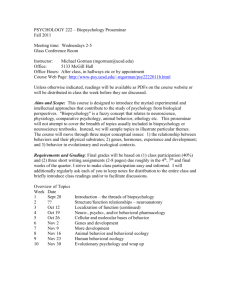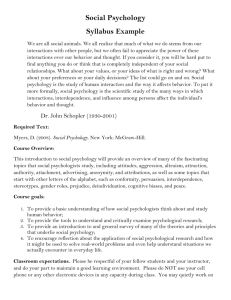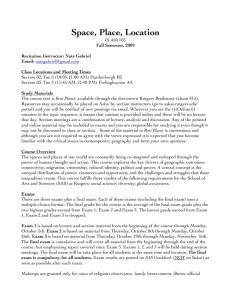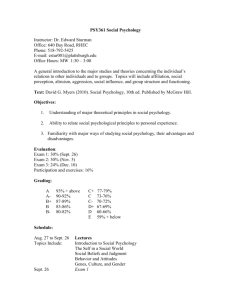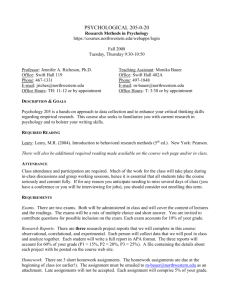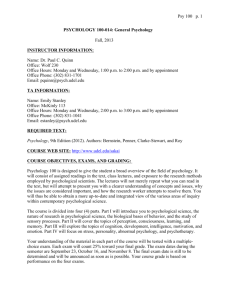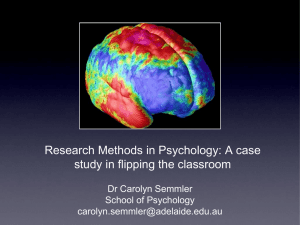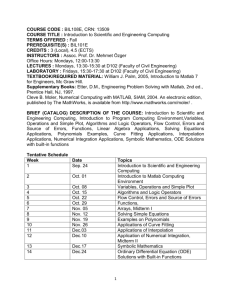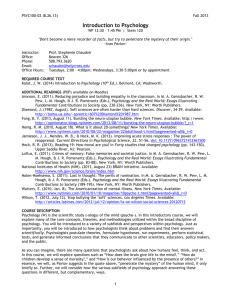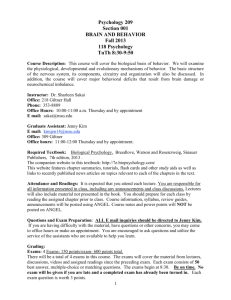Intro to Physiological Psychology Psychology 106
advertisement
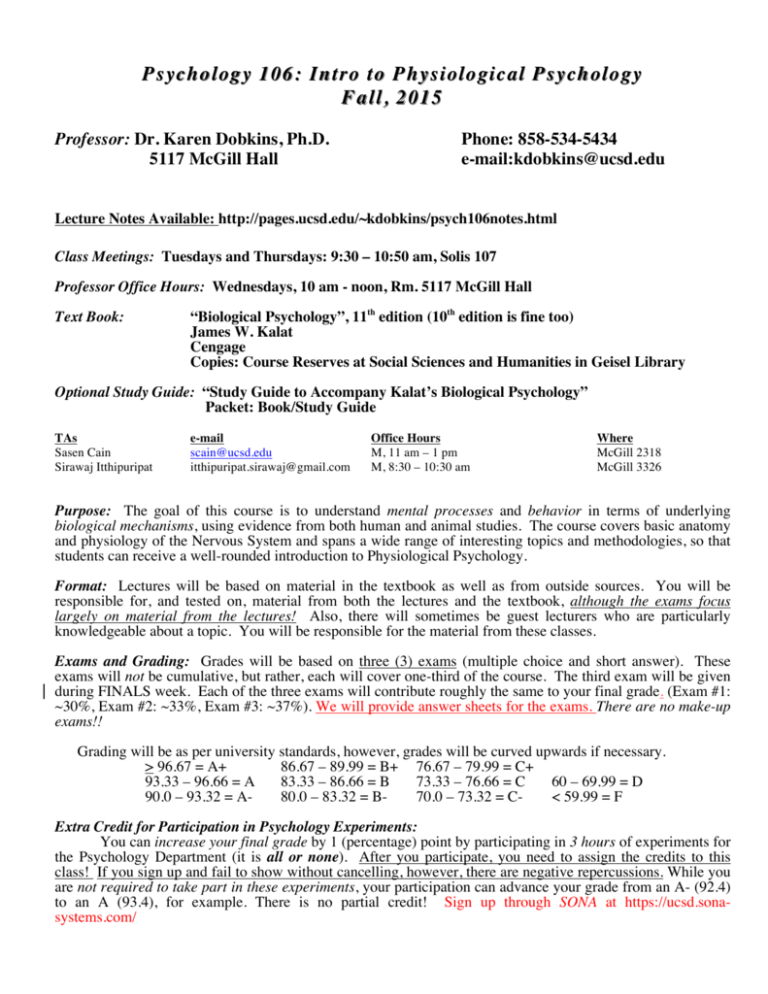
Psychology 106: Intro to Physiological Psychology Fall , 201 5 Professor: Dr. Karen Dobkins, Ph.D. 5117 McGill Hall Phone: 858-534-5434 e-mail:kdobkins@ucsd.edu Lecture Notes Available: http://pages.ucsd.edu/~kdobkins/psych106notes.html Class Meetings: Tuesdays and Thursdays: 9:30 – 10:50 am, Solis 107 Professor Office Hours: Wednesdays, 10 am - noon, Rm. 5117 McGill Hall Text Book: “Biological Psychology”, 11th edition (10th edition is fine too) James W. Kalat Cengage Copies: Course Reserves at Social Sciences and Humanities in Geisel Library Optional Study Guide: “Study Guide to Accompany Kalat’s Biological Psychology” Packet: Book/Study Guide TAs Sasen Cain Sirawaj Itthipuripat e-mail scain@ucsd.edu itthipuripat.sirawaj@gmail.com Office Hours M, 11 am – 1 pm M, 8:30 – 10:30 am Where McGill 2318 McGill 3326 Purpose: The goal of this course is to understand mental processes and behavior in terms of underlying biological mechanisms, using evidence from both human and animal studies. The course covers basic anatomy and physiology of the Nervous System and spans a wide range of interesting topics and methodologies, so that students can receive a well-rounded introduction to Physiological Psychology. Format: Lectures will be based on material in the textbook as well as from outside sources. You will be responsible for, and tested on, material from both the lectures and the textbook, although the exams focus largely on material from the lectures! Also, there will sometimes be guest lecturers who are particularly knowledgeable about a topic. You will be responsible for the material from these classes. Exams and Grading: Grades will be based on three (3) exams (multiple choice and short answer). These exams will not be cumulative, but rather, each will cover one-third of the course. The third exam will be given during FINALS week. Each of the three exams will contribute roughly the same to your final grade. (Exam #1: ~30%, Exam #2: ~33%, Exam #3: ~37%). We will provide answer sheets for the exams. There are no make-up exams!! Grading will be as per university standards, however, grades will be curved upwards if necessary. > 96.67 = A+ 86.67 – 89.99 = B+ 76.67 – 79.99 = C+ 93.33 – 96.66 = A 83.33 – 86.66 = B 73.33 – 76.66 = C 60 – 69.99 = D 90.0 – 93.32 = A80.0 – 83.32 = B70.0 – 73.32 = C< 59.99 = F Extra Credit for Participation in Psychology Experiments: You can increase your final grade by 1 (percentage) point by participating in 3 hours of experiments for the Psychology Department (it is all or none). After you participate, you need to assign the credits to this class! If you sign up and fail to show without cancelling, however, there are negative repercussions. While you are not required to take part in these experiments, your participation can advance your grade from an A- (92.4) to an A (93.4), for example. There is no partial credit! Sign up through SONA at https://ucsd.sonasystems.com/ Syllabus Psychology 106, Fall 2015 Instructor: Dr. Karen Dobkins, Ph.D. 1) Sept 24: Introduction to Class (Chapter 1) 2) Sept 29: Major Issues of Biological Psychology (Chapter 1) 3) Oct 1: Nerve Cells & Nerve Impulses (Chapter 2) 4) Oct 6: Synapses & Drugs (Chapter 3). Save “Hormones” section for later in the course 5) Oct 8: Anatomy of the Nervous System (Chapter 4) 6) Oct 13: Investigating how the Brain Works (Chapter 4 and throughout the book) 7) Oct 15: Development & Evolution of the Brain, Intelligence (Chapter 5, and a bit from 4) 8) Oct 20: EXAM #1 (Material from Lectures 1 - 7) 9) Oct 22: Vision (Chapter 6), Lecturer: Sasen Cain 10) Oct 27: Vision, continued, (Chapter 6) 11) Oct 29: Audition (Chapter 7) 12) Nov 3: The Mechanical Senses: Vestibular and Somatosensation (Chapter 7) 13) Nov 5: Circadian Rhythms & Sleep (Chapter 9), Lecturer: Gena Glickman, PhD 14) Nov 10: EXAM #2 (Material from Lectures 9 - 13) 15) Nov 12: Hormones & Sexual Behavior (Chapter 11, and parts of Chapter 3) 16) Nov 17: Emotional Behaviors: Fear, Anxiety, Aggression (Chapter 12) 17) Nov 19: Autonomic Nervous System, Stress and Health (Chapter 12, and parts of Chapter 3) 18) Nov 24: Learning & Memory (Chapter 13) 19) Dec 1: Learning & Memory: Neural Mechanisms (Chapter 13) 20) Dec 3: Hemispheric Lateralization & Language (Chapter 14) FINAL (Exam #3): Finals Week, Thursday, Dec 10th, 8 – 11 am (Material from Lectures 15 - 20)
